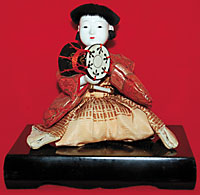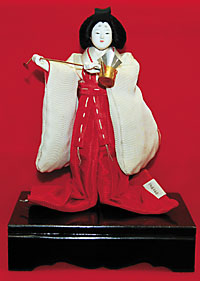 | On Hina Matsuri ("Girls Day"), Japanese families with young daughters set out displays of dolls such as this from the Peabody's Anthropology Division. |
Yale's Peabody Museum of Natural History will celebrate the annual Japanese festival of Hina Matsuri -- also known as "Girls Day" -- with an exhibition of dolls.
The dolls are part of a special collection donated to the museum's Anthropology Division in 1955 by Evangeline Johnson Merrill (1897-1990), daughter of Robert Wood Johnson, co-founder of the Johnson & Johnson Company.
During Hina Matsuri -- which falls on March 3, the day the exhibition opens -- the Japanese pray for happiness and the healthy growth of girls. Families with young daughters mark the day by setting up a display of dolls inside the house.
Hina Matsuri has its roots in an ancient Japanese custom known as Hinanagashi -- literally, "doll floating" -- a practice that dates back to the Heian period (794-1192). The third day of the third month, originally calculated by the lunar calendar, was believed to be the best time to prepare the earth for new life to grow. Farmers and villagers would make simple paper dolls to which they would "attach" their troubles and fears. They would then float the dolls down rivers beginning to swell with melted snow.
By the 17th century, dolls made by townspeople were so beautifully crafted that the thrifty-minded merchants of Edo (now Tokyo) decided it was a shame to let them float away. The merchants began to save the dolls, displaying them each year in lieu of sending them downstream. There are still a few places in Japan where Hinanagashi is still practiced.
The Peabody exhibit features 15 dolls set out in a traditional fashion, as they would be in a Japanese home, on a tiered platform covered with red felt. Dolls are typically the heritage of a household with each set reflecting the fashion of its era. The hand-made dolls in this collection, from around 1900, have costumes of brocaded silk and faces covered with gofun, or white paste made from ground seashells. Included are miniature domestic items, known as Dogu, which are made from the time of a daughter's birth, representing things the family might expect to include in her wedding dowry.
The exhibit, which is on view through Memorial Day, was organized by Robert G. Wheeler, the Harold Hodgkinson Professor Emeritus of Engineering and Applied Science, professor of physics and a curatorial affiliate in the Peabody's Anthropology Division. Yoko Karato served as a consultant.
The Peabody Museum of Natural History, located at 170 Whitney Ave., is open Monday-Saturday, 10 a.m. to 5 p.m., and Sunday, noon-5 p.m. Admission is $7 for adults, $6 for seniors age 65 and over, $5 for children ages 3-18 and free to members of the Yale community with valid I.D. Admission is free for everyone on Thursdays 2-5 p.m. The museum is wheelchair accessible. For further information, call (203) 432-5050 or visit the website at www.peabody.yale.edu.
T H I S
Doll exhibition marks Japanese
celebration of 'Girls Day'

This doll depicts a court lady
with a long-handled sake holder.
The dolls' donor was a woman who pursued feminist causes long before it was popular to do so. Merrill was a lieutenant in New York City's Ambulance Corps and was decorated by President Woodrow Wilson for her services in the Red Cross in World War I. In the early 1920s she waged a one-woman war against the city government in Palm Beach, Florida, which refused to allow the new abbreviated women's bathing suits to be worn in public. Merrill had a large number of handbills printed in protest and flew over the beach tossing them from the cockpit of a plane she had recently learned to fly. A collector of art and anthropological artifacts, she traveled worldwide with each of her three husbands, the first of whom was renowned conductor Leopold Stokowski.
 W E E K ' S
W E E K ' S S T O R I E S
S T O R I E S![]()
 Noted critic and artist Robert Storr named next dean of School of Art
Noted critic and artist Robert Storr named next dean of School of Art![]()
![]()
 Two faculty receive prestigious prizes
Two faculty receive prestigious prizes
 Joseph Roach wins Mellon Award for studies on world performance
Joseph Roach wins Mellon Award for studies on world performance![]()
 Joseph Schlessinger gets David Prize for work on cancer treatment
Joseph Schlessinger gets David Prize for work on cancer treatment![]()
![]()
 Brothers' gift to renovate site of their former athletic glory
Brothers' gift to renovate site of their former athletic glory![]()
![]()
 Yale licenses ovarian cancer test technology to LabCorp
Yale licenses ovarian cancer test technology to LabCorp![]()
![]()
 Gallery acquires rare painting by Yale-educated artist
Gallery acquires rare painting by Yale-educated artist![]()
![]()
 Yale donates important set of books to the British Parliament
Yale donates important set of books to the British Parliament![]()
![]()
 ENDOWED PROFESSORSHIPS
ENDOWED PROFESSORSHIPS
 Richard Casten is named D. Allan Bromley Professor
Richard Casten is named D. Allan Bromley Professor![]()
 Peter Swenson is new Charlotte Marion Saden Professor
Peter Swenson is new Charlotte Marion Saden Professor![]()
![]()
 William Clyde DeVane Medals are awarded to two scientists
William Clyde DeVane Medals are awarded to two scientists![]()
![]()
 Ignorance of world news could imperil the nation, says journalist
Ignorance of world news could imperil the nation, says journalist![]()
![]()
 Event explored 'Youth and the Future of U.S.-Islamic Relations'
Event explored 'Youth and the Future of U.S.-Islamic Relations'![]()
![]()
 Doll exhibition marks Japanese celebration of 'Girls Day'
Doll exhibition marks Japanese celebration of 'Girls Day'![]()
![]()
 Museum hosting talk on Connecticut day trips, annual 'Fiesta Latina'
Museum hosting talk on Connecticut day trips, annual 'Fiesta Latina'![]()
![]()
 Chinese Christian art is featured in Institute of Sacred Music exhibit
Chinese Christian art is featured in Institute of Sacred Music exhibit![]()
![]()
 Study suggests people may learn best on an empty stomach
Study suggests people may learn best on an empty stomach![]()
![]()
 VaxInnate officials to speak in next event of seminar serie
VaxInnate officials to speak in next event of seminar serie![]()
![]()
 Volunteers sought for Ob/Gyn's Kronos Early Estrogen Prevention Study
Volunteers sought for Ob/Gyn's Kronos Early Estrogen Prevention Study![]()
![]()
 Competition aims to educate campuses nationwide about recycling
Competition aims to educate campuses nationwide about recycling![]()
![]()
 Yale Books in Brief
Yale Books in Brief![]()
Bulletin Home |
| Visiting on Campus
Visiting on Campus |
| Calendar of Events
Calendar of Events |
| In the News
In the News![]()
Bulletin Board |
| Classified Ads
Classified Ads |
| Search Archives
Search Archives |
| Deadlines
Deadlines![]()
Bulletin Staff |
| Public Affairs
Public Affairs |
| News Releases
News Releases |
| E-Mail Us
E-Mail Us |
| Yale Home
Yale Home